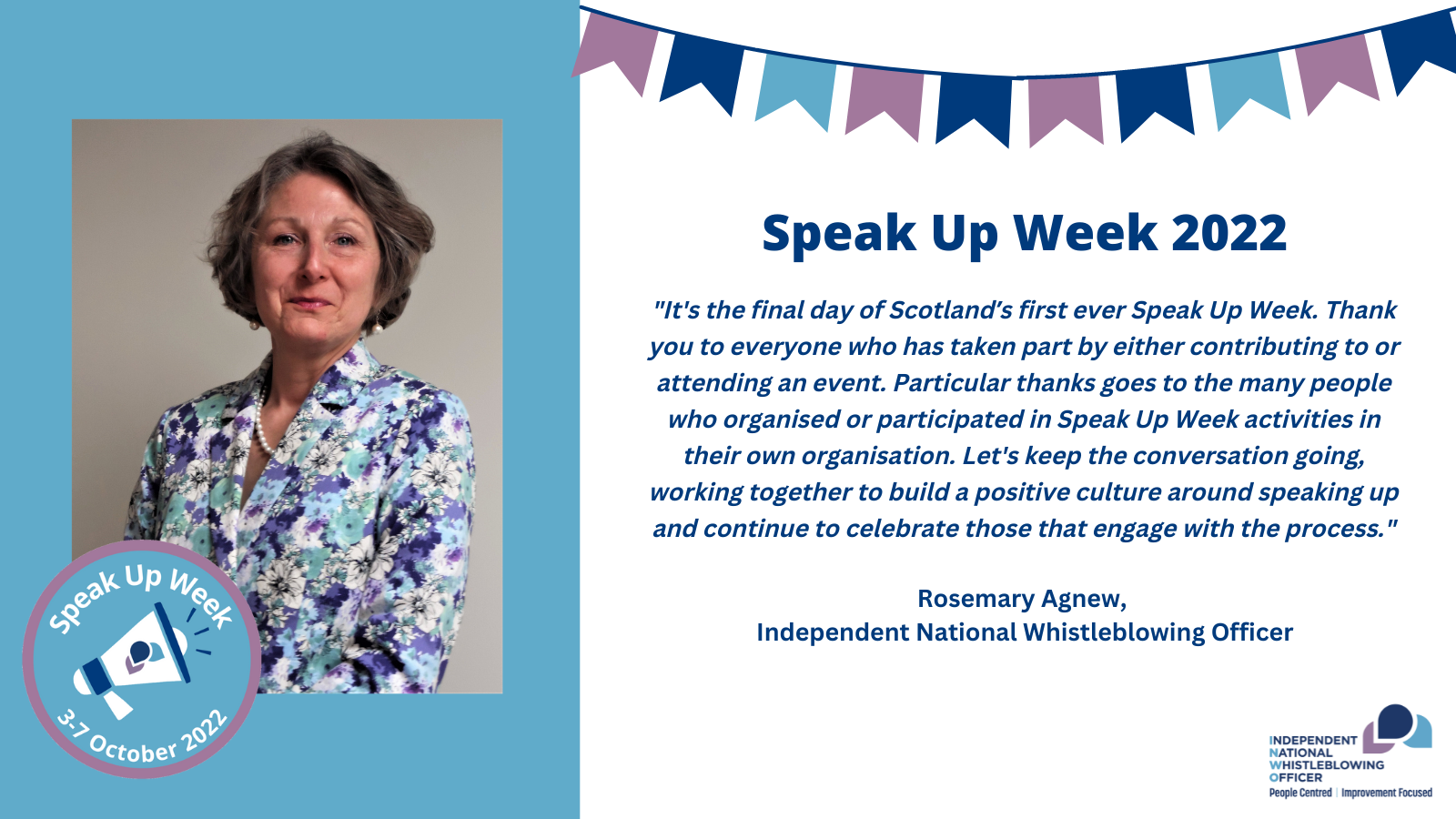
The week in review
NHS Scotland’s first Speak Up Week has been a great opportunity for boards to highlight the benefits of speaking up. We hope that you got as much out of it as we did! We’ve been delighted by the engagement we have seen from boards during the week on social media and if you missed anything you can catch up on Twitter by viewing #SpeakUpWeek.
The week started with an inspiring conversation between Dr Jayne Chidgey-Clark, the National Guardian and Rosemary Agnew, the Independent National Whistleblowing Officer. It was great to have the leaders of these organisations taking time to share their experiences and thoughts about speaking up and the benefits a strong speak up culture can bring. The video is really worth a watch and at the end both leaders shared their top tips for organisations, individuals and managers:
- For NHS management: move your mind-set to a growth mind-set; remember that people are giving you a gift of information when they speak up; and be as courageous yourself as you would like other people to be in speaking up when things aren’t right.
- For individuals, people who need advice should speak to their FTSU guardian (England) or a Confidential Contact/Whistleblowing Ambassador (Scotland) so they can be supported through it. Also people in Scotland can pick up the phone and speak to the INWO team who will help with realistic and meaningful advice (for more details, see below).
- For managers receiving concerns, be curious about what the information is telling you (and not defensive). Be open, and put the person speaking to you as much at their ease as you can, without forming any judgements until the issue is fully explored.
On Tuesday our Spotlight on Confidential Contacts blog talked about the value of the Scottish Speak Up Network in supporting isolated colleagues, and the development and standardisation of the role.
The Spotlight on Whistleblowing Champions blog on Wednesday highlighted the Champions’ position as the guardians of the whistleblowing process in Scotland’s NHS. We also looked at how the Champions have come together to understand and develop their roles, and share learning from their experiences so far.
Our panel session with Niki Maclean (SPSO), Simon Watson (Healthcare Improvement Scotland), Stewart Hughes (SSE) and Sean Parker (Civil Aviation Authority) showed how building trust and transparency is vital for staff to have confidence in raising concerns. That involves treating speaking up as a onetime event and handling it right the first time, or people are unlikely to come back. From a management point of view, it is about seeing the purpose of your speak up process as a way for employees to tell you where the problems are, and not just a functional way to manage people who have concerns. Providing feedback is also very important so that people know that processes are working and that speaking up is worthwhile. Building trust also takes in the aftercare that people get when they speak up, so that they are assured that they won’t experience detriment. Our speakers noted that trust and transparency does not happen overnight. It takes years to build and moments to destroy. Watch the discussion here.
What happens next?
Speak Up Week has been a really positive campaign for raising awareness amongst staff about the benefits of speaking up and who to speak to. But the ideas and activity generated are just part of an ongoing process. We know that some boards are doing well at encouraging people to speak up, listening to them and acting on the concerns, and their reports reflect this. But others have work to do to get staff to feel comfortable raising concerns. This is where senior leaders and people responsible for whistleblowing governance have an opportunity to take the lead and demonstrate that speaking up is welcomed and valued. Talking about speaking up should continue throughout the year and should be a regular focus of communications with staff.
Thank you to everyone who has taken part in Speak Up Week. We were extremely encouraged by the enthusiastic response of NHS organisations, and we appreciate all the work that has been put into it. We would love to hear about what you did, please send your feedback to [email protected]. We look forward to working with everyone again next year on Speak Up Week 2023!